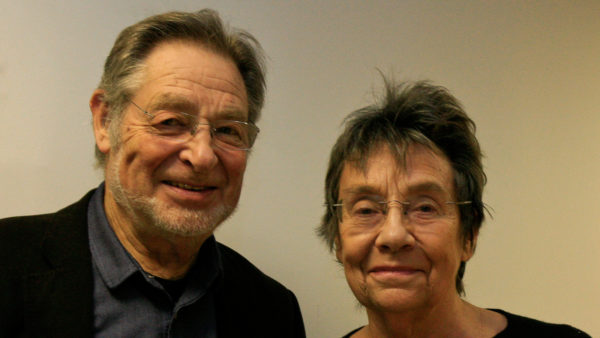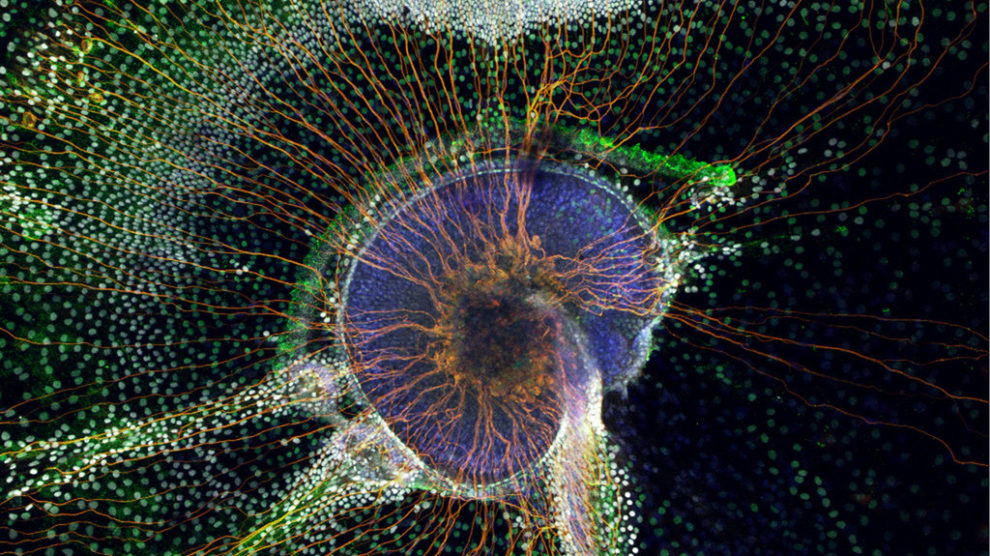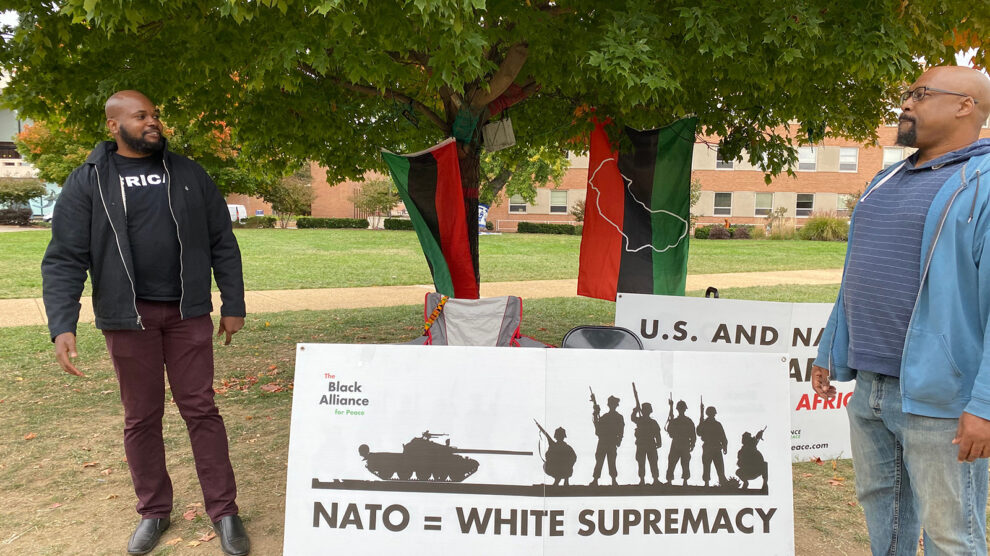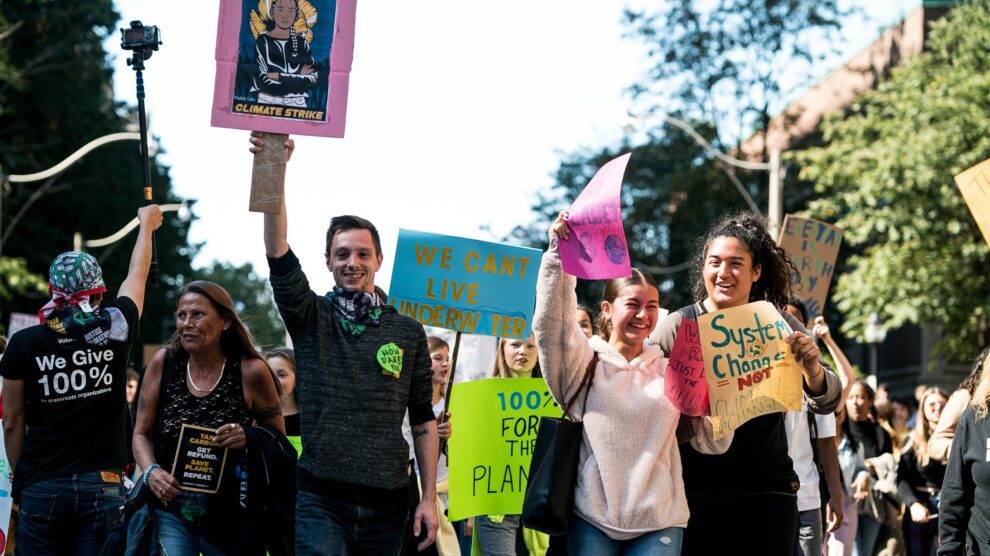Palestine and Science: An Interview with Hilary Rose & Steven Rose
By Katherine L. Bryant
Volume 23, number 1, Science Under Occupation
This interview is co-published with Monthly Review.

Hilary Rose, a sociologist, and Steven Rose, a neuroscientist, were two of the principal founders of the British Society for Social Responsibility in Science (BSSRS) in the late 1960s in London. BSSRS was linked to radical science initiatives like the Radical Science Journal, the Centre for Alternative Technology (CATS), and the magazine Undercurrents, and was responsible for the magazine Science for People. Together, Hilary and Steven have written dozens of books and papers, stretching back fifty years, on the relationship between politics and science. In 2002, they wrote a letter to The Guardian calling for a moratorium on collaborations with scientists backed by the Israeli government, which gained hundreds of signatures from other scientists. On November 10, 2019, I went to their book-filled London home and spoke with them about their work as scientists and anti-war activists.
KATHERINE BRYANT: Can you tell us about the work that you’ve done around Palestine and Israel?
HILARY ROSE: To me, science is always integral to the occupation, even as some scientists try to resist it. It’s a bit like, for example, Chomsky, who took a great deal of money from the Defense Department, arguing that his work could not conceivably be of any interest to the military. The military was saying, at more or less the same time, “We do not support anything that is not of interest to us.” So this is the problem—the kind of consciousness that scientists have of what they’re doing is not necessarily the same thing as the plans of their paymasters.
For Palestine, science under occupation has a very particular history. What does Israel cherish? After the army, the idea of science and technology. In the past, collaborative European research projects involving several countries often included Israel, even though it is not in the EU, because they were very powerful in science and technology. So we wrote, Steven and I, a very straightforward letter to The Guardian newspaper urging researchers not to invite Israeli academics to join these European projects—just to have a moratorium until Israel behaves in accordance with UN resolutions and human rights legislation. And then we asked people to sign the letter. And that’s really how it began.
STEVEN ROSE: So to be precise, the call was for a moratorium on collaborative research with Israel, until such time that Israel would accept an agreement to peace and justice with the Palestinians. The response to the letter was very positive. That’s when all the other signatures began pouring in.
HILARY: And it produced a wonderful public debate. The BBC has this view of balance: you must have somebody on one side and somebody on the other. We had debates with British and other European Jewish scientists. Some were quite gentle, some ferocious. We had Israeli scientists. The arguments we had were so powerful. “Well, you say you’re a scientist but for six weeks in every year, you’re working with the defense force, because that’s part of your job. Most of us wouldn’t do it. Because we would see that Israel’s policies were completely incompatible with how we live in the world.” And these arguments were enormously successful. And then these Israelis, far from stupid, refused to take part in these debates.
STEVEN: I should say that I, but not Hilary, come from an Orthodox Jewish background, so I know this history—I’ve got relatives who went out to live in Israel at the foundation of the state in 1948. The extent to which Israel has been ethnically cleansing the Palestinians, both in the war in 1948 and subsequently, means that they are being restricted to a smaller and smaller area of what used to be Palestinian territory. But at the same time, the Israeli government (or Israeli state) practices something which is very close to apartheid. And against that, Israel’s continual delaying attempts—by the Palestinians and the international community—to negotiate some sort of settlement, has clearly been a way of simply letting the ethnic cleansing go on, but on slow speed, with the immense backing from the United States, which as we know spends more on overseas aid per head of the population on Israel than [on] any other country in the world. And that alliance is most powerful for the Israelis. The second most powerful alliance is with Europe, through institutions like the European research initiatives. That’s the background to the call for a moratorium as a peaceful, non-violent way of putting pressure on the Israeli government.
HILARY: We only asked for a moratorium. Because it would be absolutely improper for people in one country to ask for a boycott on people in another country. All we could say was, we, as Europeans, should consider very carefully before we collaborate in research terms with a country whose policies we abhor. We got, in this period, a ton of hate mail, which nowadays we take for granted, but then, we were shocked to bits. And it didn’t have the effect that I think was wanted—they wanted us to be afraid. And actually it just made both of us intensely angry. And this attack meant that we were really committed.
At the same time, some civil society Palestinians created a group called “Palestinian Campaign for the Academic and Cultural Boycott of Israel” (PACBI), which superseded our call. The other thing which was fascinating was that we got to know the Israeli opposition. And they weren’t the official opposition, always talking on platforms and things—these were people, scientists in their jobs and sociologists in their jobs who supported Palestinian rights. We met this group of people trying to change the state of their piece of the country.
Steven comes from an Orthodox Zionist family. So he was brought up in a culture which believed in the Zionist project. That doesn’t mean to say that you believe in what the Zionist project has become. I was brought up in a socialist household. The socialists saw the terrible things being done to European Jews by the Nazis, and felt they should have somewhere to live. Our absolutely insulting failure: that we did not think of the people who were living there already. We fell for the story that Israel is a “land without people” for a “people without land.”
And that was a big lie. And it was also the lie that the British always told. As colonialists they would go to Australia and say, “There are no people there.” And what you do in this circumstance—a very old piece of sociology—you either ethnically cleanse them, or you kill them. This is the standard imperial move.
For me it was actually a very important shift. So I began to dig and dig and dig about the history of Israel because I’d never really thought about it. And the more I understood, the more horrified I was. And something similar was happening to Steven. The thing that made us work so hard was that we both felt absolutely ashamed for ever having believed in the Zionist myth. So it was our responsibility to work as hard as we could to help change things.
KATHERINE: Where would you say things stand today?
STEVEN: Our original hope was that a sufficient number of academics and researchers would refuse to join research collaborations with Israeli universities and the Israeli state. It’s important to emphasize that our boycott was always never aimed at individual Israelis. It’s aimed at the state—the state institutions which fund Israeli science.
HILARY: It was because they were getting their pay from the Israeli state that we were against them. So the last thing it could be is anti-Jewish. They could be anybody. If they were taking money from the Israeli state, then as far as we were concerned, they were part of the boycott.
STEVEN: And another point, because you ask about science under occupation in Palestine. There are Palestinian social and natural scientists, engineers, technologists, mainly in the diaspora, but still trying to work within Palestine and in the West Bank itself. Particularly the work of the psychiatrists and the neurologists in the Gaza hospitals trying to treat the victims— both emotional and mental casualties as well as the more obvious physiological casualties. It’s important for working scientists to recognize the constraints under which Palestinian scientists have to work. I thought it’d be an interesting idea to try to develop research collaborations with colleagues in Bir Zeit, but it required the import of radioisotopes. The Israelis would not let the Palestinians import radioisotopes. There was no way that we could do the assays in this experiment. And, of course, for Palestinian scientists going to international conferences is dependent upon them getting visas. Getting out of Gaza is almost impossible. Getting out of the West Bank is pretty tricky.
HILARY: Palestine’s excellence in training engineers was such that Palestine exported engineers all around the Mediterranean. It demonstrated an amazing amount of creativity with few resources, except the ingenuity and determination of the Palestinians.
KATHERINE: I was wondering if you could talk about how you see the left and their relationship with science.
HILARY: I wrote a book a very long time ago which discussed this [Love, Power and Knowledge, 1994]. One of the things I was looking at was science fiction. One of the fantasies in the men’s science fiction was when earth is completely messed up, they would get into rockets and go and live on another planet. I think you will have seen some discussion?
KATHERINE: Yes, yes. Sounds familiar [laughs].
HILARY: Yeah [laughs]. I do not take an overly hopeful view. I think it’s an extremely tough situation. I’m really sad that I’m now an old person and I’m sad that I can’t see too many good things, which is why I treasure SftP. And why I treasure Extinction Rebellion in this country [the UK]. It’s such a huge force. And they’re out there organizing in ways I’ve never seen before. They’re hugely reliant on social media and very smart communications. And they’re immensely imaginative. They seem to be a learning organization, which is very important anywhere—on the left, for any radical spirit, and for any spirit who wants to bring about social change.
STEVEN: But the “traditional left” always saw science as a progressive force. A force which was deformed under capitalism, but which was, as it were, unrestrained. You ask the question, “Can there be ‘technofixes’ for the current situation?” Well, my thoughts about the proposals for geoengineering—for example, seeding the atmosphere or changing the pH of the seas and so on—fill me with a sense of existential terror. I think it is being grandiose in terms of what you can do, with unpredictable consequences. I think one’s got to look not at the technofix—you’ve got to look at the transformation of the way in which all of us live and ask how you move towards that in a time of gross inequality within and between nations. How you move toward that, to achieve some sort of equity which still preserves what’s left of the planet as we know it, is the major challenge for our time.
HILARY: One of the things that came off the scientists, and what I read about scientists writing about science, was this sense that they thought that technical progress was synonymous with social progress. For me, it was the atomic bomb. How could you think, as Einstein clearly thought, that his formula was separate from technology? So my problem was: “How did science get like this?” As I was a sociologist, not a scientist, I spent a lot of time talking with scientists, and that’s how Steven and I met and how we’ve gone on working together. Because part of Steven, and I’m sure you [Katherine], still has this passion that science can be made to serve the people—and at the same time, this clear-eyed recognition that that is not what it was doing. [In] the first book we did [Science and Society, 1969], which was so long ago in the 1960s, we were trying to see where the money went. And one of the things I think we were both shocked by was the amount of money that went to military research. When you saw this and the then-exponential growth of the number of people working in science, and the resources they command and take, and the slice that the military research still takes, and the closeness of the academics with military research, there is good reason to be frightened.
So, the macro picture, I think, is not very encouraging, but the many, many micro pictures are hugely much better. The thing is to keep talking about not just the bad things but the good things, the achievements. Because we need to share those and say, “Look, we did this. We can do more.” As a social scientist, I worked on social policy in [the UK] between 1945 and the mid-1970s, and this country passed through a period of great equality. Now, we’re back to something like the 1930s. There are children in this city with no food on the table. That could not have happened when I was a young woman. We would have been outraged. Now, it can happen. Now, we’ve got food banks where what we need is a powerful welfare system and a decent labor market policy and so forth. Those have to be fought for. I’m afraid what we can say is that there is a lot of work for us all.
See SftP member Michael Harris’ statement on this interview.
About the Authors
Katherine L. Bryant is the secretary of Science for the People and a postdoctoral fellow at the Wellcome Centre for Integrative Neuroimaging at the University of Oxford. During her PhD she helped organize undergraduates, graduate students, and faculty to fight against austerity measures implemented by the university administration. In addition to conducting research on the evolution of the human brain, she works to promote the work of feminist neuroscientists through the Neurogenderings group, and to support and advance the work of Science for the People.
Hilary Rose is a sociologist of science, Steven Rose a neuroscientist. Their first joint book, Science and Society, published in 1969, demanded the democratic accountability of science. This demand, plus the anti-war movement’s rage against CBW led to the formation of the British Society for Social Responsibility in Science. Science’s androcentricity and worse, led Hilary to write Love, Power and Knowledge (1994), proposing a feminist science. They were central in the Academic Boycott of Israel in the 2000s. Their most recent books are Genes, Cells and Brains (2012) and Can Neuroscience change our Minds? (2016). Currently they are writing their memoirs.





